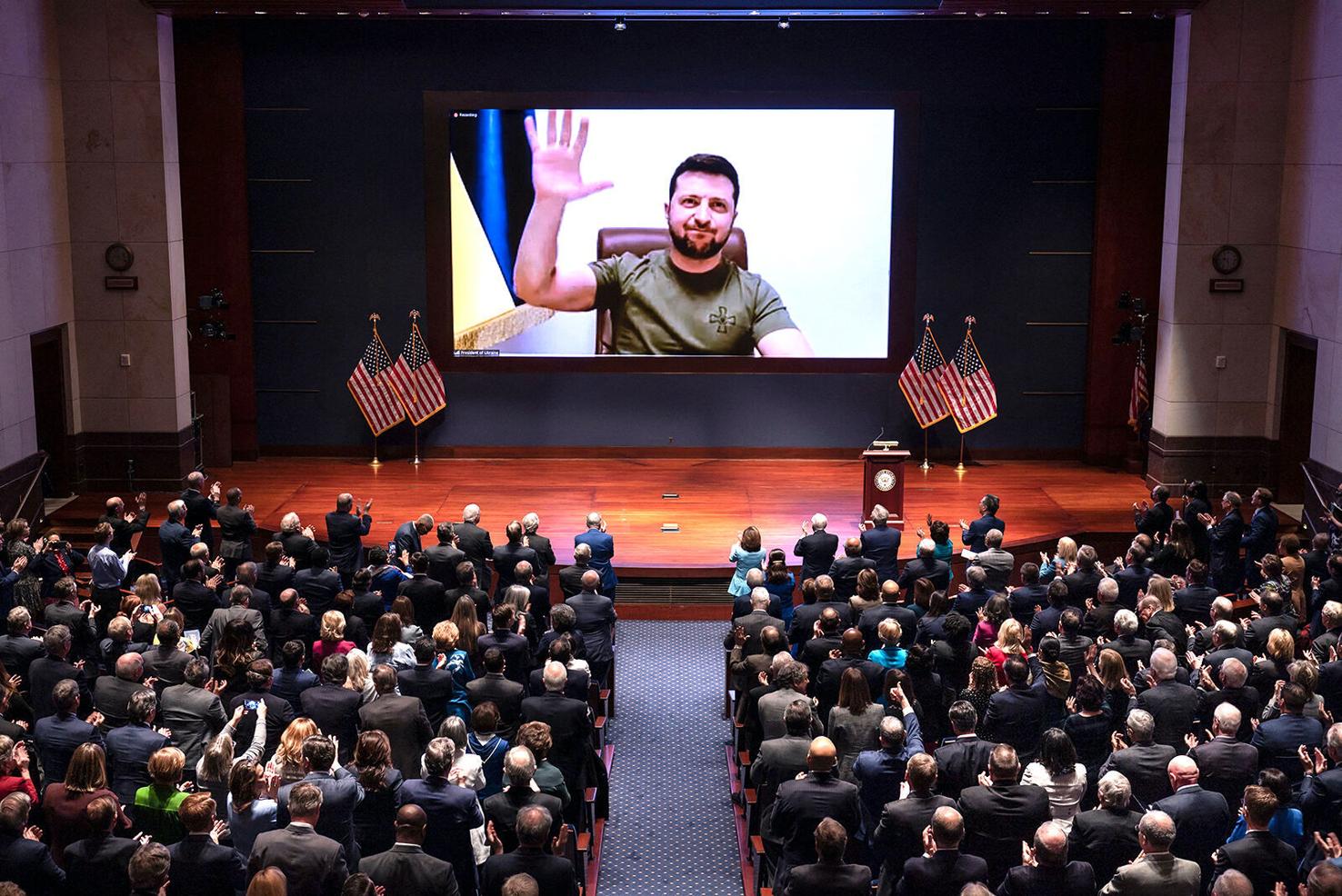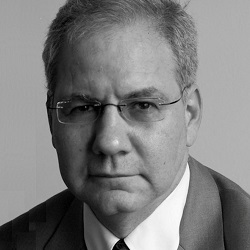Moral Equivalence and Ukraine
There is a growing chorus of voices here at home who continue to draw a moral equivalence between victim and aggressor, and worse.

Published by The Lawfare Institute
in Cooperation With

The Russian invasion of Ukraine was a criminal act: waging aggressive war, the supreme crime for which the Nazis were punished at Nuremberg. And Russian forces have also engaged in other crimes of war: the unremitting shelling and bombing of civilian targets like the martyr city of Mariupol, widespread rape, and the torture and murder of civilians, as seen in Bucha and other Kyiv suburbs as revelations come before the world. With every passing day, Ukrainian suffering continues on a horrific scale. Thousands of civilians have been killed. Many more are maimed. Over 7 million people have been internally displaced. Over 4 million refugees have fled abroad—women, children and the elderly—driven from homes that have been reduced to rubble.
President Biden has branded Vladimir Putin a war criminal and accused Russia of committing genocide. According to Barbara Starr of CNN, the U.S. believes “it will be able to identify the Russian units” that are responsible for atrocities. Already there are discussions and plans in various world capitals for issuing indictments and placing the perpetrators on trial before the Hague. Of course, justice will not come so long as Vladimir Putin is in power, and even if he were dispatched, it is doubtful that a successor regime would allow members of Russian forces to be extradited and put on trial. For now, the invasion has prompted countries in the West to mete out a slate of robust sanctions, quite possibly with more stringent ones to come.
But against this background of increasing horror, and the West’s unfolding response to that horror, there is a growing chorus of voices here at home who continue to draw a moral equivalence between victim and aggressor, and worse.
Madison Cawthorn, the congressman from North Carolina, has described Ukrainian President Volodymyr Zelenskyy as a “thug” and called the Ukrainian government “incredibly evil,” faulting it for “pushing woke ideologies.” Fox television host Tucker Carlson, who earlier declared he was on Russia’s side in the conflict with Ukraine, has pedaled in reverse. He now says, “Russia’s invasion of Ukraine was shocking, it was wrong, the suffering of civilians there is entirely real, we’re watching it on TV, it’s horrifying.” Nonetheless, he continues to give voice to Russian talking points, which are regularly rebroadcast on the propaganda channels of Russian television.
Remarkably, in a demonstration of equivocation about the war, 63 members of the House of Representatives, all of them Republican, voted against a nonbinding resolution reaffirming America’s “unequivocal support for the North Atlantic Treaty Organization as an alliance founded on democratic principles.” Fifteen Republican representatives, including Marjorie Taylor Greene, Matt Gaetz, and Paul Gosar, voted against a bill to ban the import of Russian oil, gas and coal. Six Republicans, including some of the same members, voted against a bill mandating the investigation of Russian war crimes.
It is not just voices on the right. Tulsi Gabbard, the heterodox former congresswoman from Hawaii, has been casting blame away from Russia: “This war and suffering,” she wrote in a tweet, “could have easily been avoided if Biden Admin/NATO had simply acknowledged Russia’s legitimate security concerns regarding Ukraine’s becoming a member of NATO.” Gabbard has also pushed spurious stories about Ukrainian biowarfare labs, for which Sen. Mitt Romney accused her of spreading “treasonous lies.” Ilhan Omar, the congresswoman from Minnesota, has complained that, in responding to Russian aggression, her fellow progressives “have abandoned their principles of being anti-war, anti-broad-based sanctions, anti-harmful policies that not only impact us here in the United States, but inadvertently impact the civilians of our adversary regime.” Omar was one of two Democrats to join the 15 Republicans in voting against the bill to ban the purchase of Russian fossil fuels.
Into this unholy mix of Republican and Democratic politicians, and adding weight to their voices, a group of intellectuals and journalists have dropped a statement titled “Away From the Abyss.” It appears under the auspices of Compact magazine, a new online venture that brings together thinkers on the left and right in the name of combating “the overclass that controls government, culture, and capital.” Compact’s founding editors are the Catholic integralists Sohrab Ahmari and Matthew Schmitz, and a Marxist, Edwin Aponte. Among the three dozen signatories of the statement, in addition to the aforementioned editors, are Patrick Deneen and Michael Anton, two post-liberal luminaries on the right, and Glenn Greenwald and Samuel Moyn, stalwart men of the left.
“Leading interventionists in the United States and Europe,” reads the first line of the statement, “are goading the West into an abyss of war and suffering, from which there can be no easy return.” The statement acknowledges that the war was “created” by Russia and is “wrongful,” but the “urgent” danger the war poses is not only Russian “imperial aggrandizement” but also Western “schemes of regime change,” which are “fantasies” that “invite still larger catastrophes.” With a nuclear confrontation potentially in the offing, “too many in the West pursue escalation, over and against the interests of millions.”
In the account given by the letter’s signatories, it is not merely Russian aggression that is causing the pain. There is also Ukraine’s own “attempt to bog down Moscow in a long, devastating insurgency.” And Ukrainians are not the only victims of the conflagration: “Ordinary Russians … are caught in the dragnet of indiscriminate Western sanctions. Crude anti-Russian attacks—directed against artists, athletes … who bear no responsibility for Kremlin actions—threaten to embitter a generation.”
The statement ends with a plea for resistance against “escalation” of the war and lists several policy recommendations. “We urge the Biden administration to focus on an immediate humanitarian ceasefire, as a prelude to good-faith negotiations.” The goal should be “a permanent peace that takes into account Ukraine’s right to self-determination and Russia’s legitimate security needs.” Biden should also declare “unequivocally that regime change in Moscow is not a U.S. policy goal.” And he should refrain from “grandiose rhetoric,” as when he described the confrontation with Moscow as “a long war ‘between democracy and autocracy.’” In its concluding words, the statement implores that “we must step back from the abyss. We ask people of goodwill to join us in saying No to the illogic of escalation.”
The war on Ukraine marks a turning point in history. The post-Cold War chapter has closed and a new era of major state conflict has opened. Future generations will look back at this moment to see what those in the West thought and did in response to naked aggression. It is with a long view in mind, and with the fate of Ukraine hanging in the balance, that observers should scrutinize the Compact declaration.
The statement’s opening line—“Leading interventionists in the United States and Europe are goading the West into an abyss of war and suffering”—stands matters on their head. The “abyss of war and suffering” was opened by Vladimir Putin in an act of unprovoked aggression, not by unnamed “leading interventionists” in the U.S. and Europe, whoever they might be. Then there is the statement’s remarkable attempt to place blame for the bloodshed on Ukraine itself. Ukraine is faulted for its “attempt to bog down Moscow in a long, devastating insurgency,” as if this is an eventuality that Kyiv invited or desires. This is a case of moral inversion, placing responsibility for the conflict on its victims. Beyond noting that “foremost among the victims are the Ukrainian people,” the balance of sympathy in this declaration seems often to lean toward “ordinary Russians” who are said to be the victims of “indiscriminate sanctions.” Ukrainians are being executed in cold blood, but it is Russians, says Compact’s statement, who are at risk of becoming “embitter[ed].”
The call for an “immediate humanitarian ceasefire” has a surface appeal until one considers that Russia is occupying Ukrainian territory, that its forces have suffered a battering, and in some locations, as near Kyiv and Chernihiv, it has beat a hasty retreat. But Russia is still fighting in the south and east. Putin would like nothing more than a cease-fire that locks in place Russian occupation of those key strategic portions of Ukraine. The aggressor would be rewarded.
The statement speaks of the “illogic” of escalation. But its plea for “good faith negotiations” and a recognition of Russia’s “legitimate security needs” returns us to the logic of Munich. To believe that Putin operates in “good faith” is the same assumption made by the appeasers in 1939. Neville Chamberlain thought Hitler was operating in good faith, a man of his word. Does the master of the Kremlin, who openly aspires to re-create the Soviet empire, have “legitimate security needs” that require tending? Without doubt, Putin has security needs, but as is plain from the attempt to annex a neighboring country in its entirety, there is nothing legitimate about them.
With its warning against those in the West who are allegedly pursuing escalation “over and against the interests of millions,” the Compact declaration is playing directly into Putin’s hands. For it is Putin who has been rattling Russia’s nuclear arsenal, attempting to intimidate the West by threatening the apocalypse. Western leaders seeking to aid Kyiv have, if anything, been notably restrained in coming to Ukraine’s assistance, arguably to a fault, as in their reluctance to supply Kyiv with MiG-29s. Implicitly to charge them with recklessness is another inversion, this time not of morality but of truth.
The statement dismisses regime change as a dangerous “fantasy.” Putin’s downfall could indeed come at some unknown cost; the Russian dictator might well prove unpredictable when boxed into a corner. But the price of his continued rule is further aggression, rape, torture, and murder on a mass scale—it is already unacceptably high. The statement warns against “schemes” to dislodge him, but this is the real fantasy, for no such schemes exist. No party to the conflict has made Putin’s removal a condition for an end to sanctions or a return to peace.
Finally, is it in any way wrong—an instance of “grandiose rhetoric,” as the signers of the declaration would have it—to describe what is transpiring in Europe as a contest between “democracy and autocracy”? Many of today’s post-liberals contend that the U.S. is itself an autocracy; in Patrick Deneen’s formulation, we currently live under “liberalocratic despotism.” So it is therefore unsurprising that they would object to such a distinction. Signatory Samuel Moyn says that “the most damaging legacy” of Putin’s aggression may not be in Ukraine at all but an abstraction: the “self-righteous return [by the United States] to the nostrums of a failed western-style internationalism.” The survivors of Mariupol might beg to differ about what constitutes the war’s most damaging legacy. Glenn Greenwald, as Jamie Kirchick has demonstrated, regularly advocates whatever position happens to be in the interests of the Kremlin, and so his signature on the declaration is equally unsurprising.
Back during the Cold War, declarations like Compact’s were a staple of left-wing discourse. Any number of organizations in the peace and disarmament movement would regularly issue statements whose gravamen was mildly to deplore the Communist East and harshly to indict the liberal democratic West. Mutatis mutandis, the Compact statement fits well within the genre. The main takeaway from the declaration is something well known from the history of the 20th century: that in the face of aggression by an evil dictatorship, intellectuals, like their politician counterparts, can be morally blinkered. And when those on the left come together with those on the right to make common cause, the moral deficit is not made whole but compounded.





